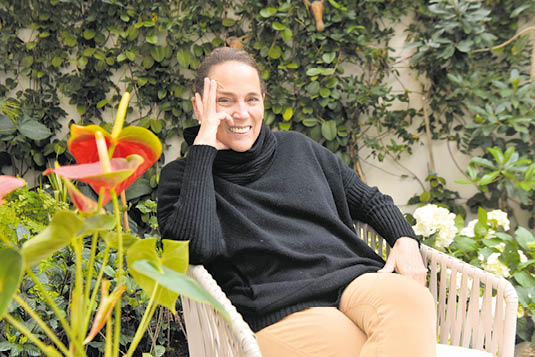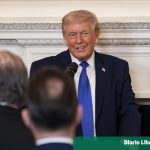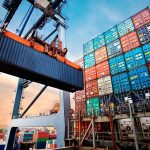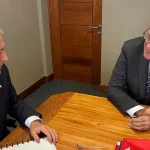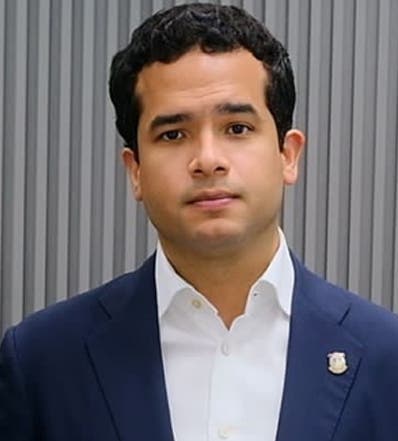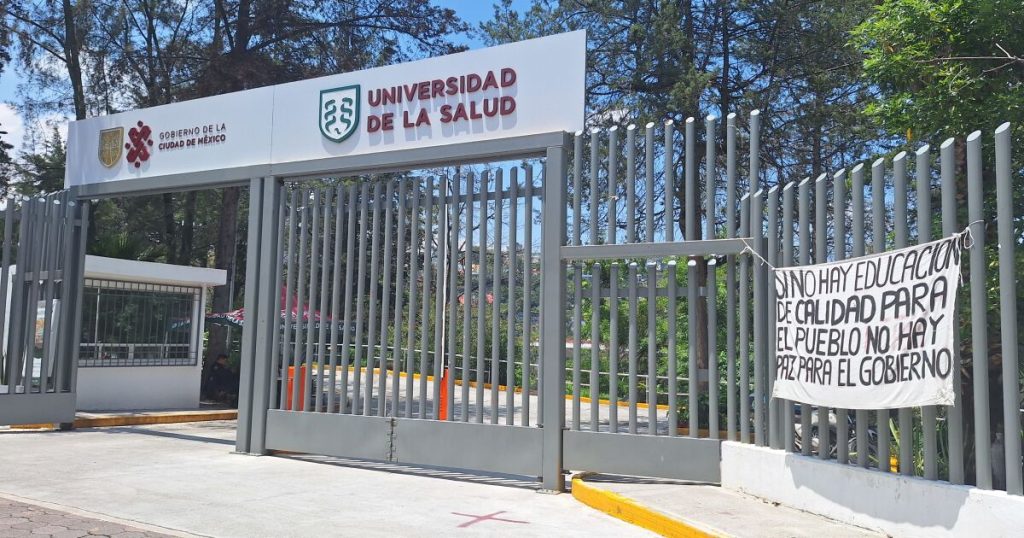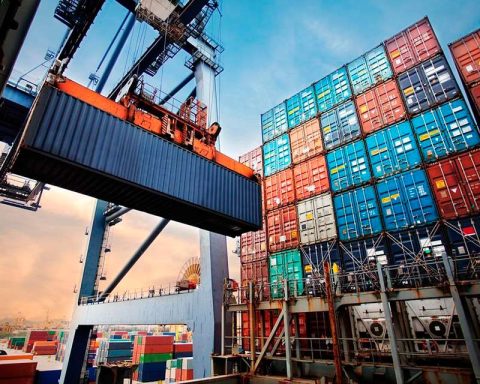Frank, quick, with a good memory and a hard worker. Leonie Roca says that she has been close to public issues since she was born. “Look, I come from a family that has always had a political life. My paternal grandfather was personal secretary and friend of Bustamante and Rivero and later, also a friend of Belaunde. My father, on the other hand, was in the PPC and was even a candidate for Congress and my other grandfather – on the maternal side – was a doctor closely linked to social security who, in fact, was recognized with a hospital in Ate that bears his name. Because of all that, because of that environment, it was normal for me to hear people talk about politics or have politicians around,” she explains.
The First Rock
On her mother’s side, she was the eldest granddaughter, but on her father’s side, she was the first with the surname Roca. That left its mark on her: “When I was born, I think my grandfather said – regardless of whether he was a man or a woman – this is my grandson, the first to bear my surname, so he always treated me like ‘a pata’. They let me be in the conversations of the adults.” Grateful, she says that she grew up in a very fertile land, where there was a lot of information, a lot of contacts, a lot of opportunities and a lot of equality. “Maybe that made me a bit of a jerk,” she reflects, “I have always respected people, but not for their position but for what they are.”
His first job was at the Andean Commission of Jurists and then he moved to the ILD [Instituto Libertad y Democracia]. “Public policies were discussed and researched and it was there that I was trained and consolidated in this more libertarian path. The ILD, at that time, was a source of knowledge, there was Julio Velarde, Jorge Gonzales Izquierdo, also people like Güido Lombardi, Mario Ghibellini, Pedro Salinas – my ex-husband – and others. It was very interesting,” she says.
The phrase “Right or left is a farce” comes up. Why?
Rather than defining myself as right or left, I am a libertarian and I have always been a person who follows my own path, who lets people do what they want, within the limits that freedom has. Since school, I have always had the ability to work with people who think differently than me. It must have something to do with the fact that we are five siblings and in large families you have to be tolerant, otherwise you kill yourself. That has always been in me, as well as the concern for poverty, inequality, people who suffer. But now, that I am more rational, I realize that what the left proposes sounds nice, but it has no chance of being carried out.
So left no…
But I’m not right-wing either, mind you. I’ve been on the left, not as a militant but emotionally. Because the discourse resonated a lot with me and still does today, but because of the social sensitivity it has. However, now, I have tools to say that what sounds nice is not going to happen or that wealth is not generated and distributed that way. Also, the issue is that when we talk about the right, in Peru and in the world, we don’t talk about libertarian mentalities, but about capitalism in the economic part and not necessarily about a more respectful view of thought and options. I feel that the right is related to extreme conservatism, which does not admit anything other than its truth. What is needed in politics, beyond the clowning of the left or right, is to design public policies based on what is possible.
Is the Peruvian politically defined?
No. At the moment, it’s anything. They are all populists, those on the right and those on the left, and that’s why you find these very strange things in Congress, where the most conservative people get together with Cerrón and company, because in the end there is no ideological basis and it’s pure opportunism. There is no training, they are people who get there because they have a certain wealth, but there is no party structure that articulates ideas with certain limits. They are simply people.
When did the deterioration begin?
What happened is that we had this, which ended up being reflected in an electoral process in 1980 where Belaunde was elected and that whole structure did not give strength to the government. I think that those 10 years, between 1980 and 1990, left the feeling that democracy was useless. After the military dictatorship came Sendero, the economic crisis and Fujimori, who seemed to be the solution.
Do you consider us an adult democracy?
No. We are a wishi/washi democracy, in formation. Peru, in political terms, is like a child at 15 years old whose hands begin to grow but not his feet and he falls forward and is covered in pimples and looks in the mirror and sees himself as horrible and has a lot of energy at the same time. It is chaos. We are an adolescent democracy that is lasting a long time because unfortunately we are covered by shameless, corrupt and lying people.
What are we missing to take the step into adulthood?
It’s complex. I would be happy to have territories freed from goodness. To suddenly have 20 municipalities that function well, with good municipal councils, with mayors who do things and begin to show that it is possible, from small to large, because the large is so rotten and everything has already been contaminated, that what we have is a cancer that has metastasized.
If I had to ask for something, it would be, regarding democracy as a basic platform, the basics: an executive that executes, a congress that legislates and oversees, and a judiciary that imparts independent justice. The ABC.
From AFIN, with all this reality, do you feel that we can move forward and serve our country?
I deal with issues that I know and I don’t want to distance myself from them, but sometimes I wonder how much of what I do has an impact? Because for something good to come out you have to fight hard for it and it’s exhausting. In fact, I think I’m one of the few people who has come out to confront the mayor of Lima.
Do you know the mayor, RLA?
No, I have never met him. As an AFIN, I have heard him say so many inaccuracies and lies that it worries me. It worries me to have an authority that says things that are not true. And I do not defend the company, but the conflict resolution mechanisms that are agreed upon in the contracts have to be honest and if by contract you commit that if you have a difference you will go to arbitration, you respect it and do not file criminal charges against the arbitrators and go out and say things that are not true. What confidence can you convey to someone who comes and invests in Peru? And moreover, as a result of all this, there are other works such as Canta Callao or Ramiro Prialé that could be being done, but are not and those who suffer the consequences are the populations that are there. It hurts me to see the indolence of someone who believes that things are solved with a speech full of lies.
What would you say about Dina Boluarte?
Dina is a difficult character to evaluate. I also think that it is difficult to ask much of her. She does not have a Congress, not even a single person there. She has arrived constitutionally, but in very complex conditions. She is not a person who was ready to be president. Nobody accepts her positions and I would say that I had fewer expectations of her, I thought she would do worse.
What have you done well?
At the economic level, she has stopped deteriorating some things. She has some ministers who know or have experience… I don’t know, Dina and her government are not going to go down in history as great reformers, but asking her to counterbalance Congress is very naive because no one in her chair would do it: they would throw her out in 2 days. Despite the precariousness, I am much more worried about the Judiciary, the Prosecutor’s Office and Congress than the Executive.
Chancay is a mega project, what is the state of public infrastructure around the port?
At zero, and there are many things to do. In Chancay there is a risk that what is happening in Callao will happen. The investment is 1,200 or 1,300 million in this first stage. The 3,500 will be if it grows, but by December the same amount will have been invested as in Callao until now. And when you leave the port you find the avenue blocked by trucks, beyond crime, health issues, etc. It turns out that the area of influence of ports is usually very delicate, in the world in general, and that requires planning for it to work. Look at Jorge Chávez, the airport will be ready and they are just looking at rebuilding the Santa Rosa bridge. You will have a super airport that is not properly connected and that can happen with Chancay. The alternative of trains coming from Brazil seems terrifying to me, it reminds me of the Odebrecht era. I also think that we must respect the Amazon, which is being destroyed by these infrastructures, and the best evidence of this is what happened in Madre de Dios with the IRSS. This road opened the way for everything we see now in the region. Although Chancay will serve several purposes, such as a hub port and a coastal port, road connectivity for cargo transportation is easy to solve, but I understand that there are discussions and that progress cannot be made yet.
We will have about 30 candidates in the next elections, is there anyone who is convincing?
We still don’t know what will happen, or how it will end. What we do know is that we will have to think of someone who is correct, who has a good team, who is moderately populist, because in a country like this there is no way not to be populist, but let’s say 70/30… I would be happy with that. But again, let’s start with having 20 good provincial mayors. Let’s start again.
About the character
President of AFIN and Vice President of Confiep. Leonie Roca currently participates in 8 boards of directors. “I love working,” she confesses. In her fourth year of high school, she decided that she wanted to be a lawyer and Raúl Ferrero, a good friend of her father and godfather of her sister, offered her to practice in his office immediately. Later, she entered the Catholic University. She did not want to be a politician, but she was interested in public affairs. Relatively early in her career, Alberto Bustamante or Diego García Sayán invited her to practice in their office.
She has been a councilor for the Municipality of Lima, Executive President of OSITRAN, Manager of ADP, Vice President of Rímac, General Manager of Clínica Internacional, among others.
Take advantage of Cyber HERE and receive our digital newspaper from S/ 54 for a whole year!
RECOMMENDED VIDEO
